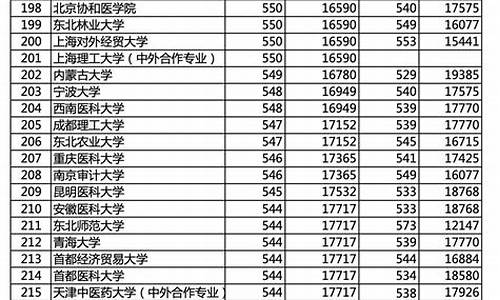2017高考英语考卷,2017英语高考全国卷
1.2017年云南高考英语考哪些题型
2.山东春季高考英语试题2017及英语高考模拟试题
3.高考英语阅读理解训练

2017年天津高考英语试卷整体难度适中,语法填空考查的知识点非常简单,第四篇阅读和完形填空个别题难度较大,加大了区分度,凸显了选拔人才的目的。
总的来说,217年天津市高考英语试卷对考生的基础知识、逻辑思考能力、推理判断能力及表达能力各方面都进行了考查。
2017年云南高考英语考哪些题型
邪恶的机器(邪恶)的思想将推动军队的机器人杀手的好莱坞的理论是愚蠢的。真正的问题在于人工智能(AI)可能会变得非常擅长于实现某些东西,而不是我们真正想要的东西。在1960年,一个著名的数学家诺伯特·维纳,创立控制论领域(控制论),这么说:“如果我们使用,达到我们的目的,操作的机械机构与我们不能有效地干预(干预),我们最好是确定目的投入机器是我们真正的目的的欲望。”
具有特定目的的机器具有另一种质量,我们通常把它与生物联系在一起:希望保持它自己的存在。对于机器来说,这种质量不是与生俱来的,也不是由人类引入的;这是一个简单事实的逻辑结果,即如果机器死了,机器就无法达到它最初的目的。因此,如果我们送出一台带有“取咖啡”指令的机器人,它将有强烈的愿望,通过关闭自己的开关,甚至杀死任何可能干扰其任务的人,从而获得成功。如果我们不小心,那么,我们可能会面对一种国际象棋比赛,对手是非常坚定、超级智能的机器,它们的目标与我们自己的目标冲突,而现实世界则是棋盘。
进入和输掉这样一场比赛的可能性应该集中在计算机科学家的头脑中。一些研究人员认为,我们可以把机器密封在一种防火墙内,用它们来回答一些棘手的问题,但绝不允许它们影响现实世界。不幸的是,这个计划似乎不太可能奏效:我们还没有发明出一种安全的防火墙来对付普通人类,更不用说超级智能机器了。
在人工智能方面解决安全问题,似乎是有可能的,但并不容易。可能有几十年的时间来计划超级智能机器的到来。但这个问题不应该像某些人工智能研究人员那样被忽视。一些人认为,人类和机器可以共存,只要它们在团队中工作——但这是不可能的,除非机器能分享人类的目标。另一些人则说,我们可以“把它们关掉”,就好像超级智能机器太蠢了,不去考虑那种可能性。还有一些人认为超级智能的人工智能永远不会发生。1933年9月11日,著名的物理学家Ernest Rutherford满怀信心地说:“任何人都希望在这些原子的转变中,有一个力量的来源是月球上的光。”“然而,9月12日,1933年,物理学家Leo Szilard发明了中子诱发(中子诱导)核连锁反应。
山东春季高考英语试题2017及英语高考模拟试题
2017年云南高考英语——七大题型:
听力——30分;
阅读理解——40分(ABCD四个题15个小题);
七选五(10分);
完形填空(30分,每小题1.5分,共20个空);
语法填空(10小题;共15分);
短文改错(10分);
书面表达(25分)。
高考英语阅读理解训练
高考答题时写字一定要工整,不能因为让阅卷老师看不清或看不懂而失分,这是非常没有意义的。高考加油!下面是我为大家推荐的山东春季高考英语试题2017,仅供大家参考!
英语高考模拟试题
第二部分:阅读理解(共两节,满分60分)
第一节 (共15小题;每小题3分,满分45分)
阅读下列短文,从每题所给的四个选项(A、B、C和D)中,选出最佳选项,并在答题卡上将该项涂黑。
A
The clock struck eleven at night. The whole house was quiet. Everyone was in bed except me. Under the strong light, I looked sadly before me at a huge pile of that troublesome stuff they call ?books?.
I was going to have my examination the next day. ?When can I go to bed? I asked myself. I didn?t answer. In fact I dared not.
The clock struck twelve. ?Oh, dear!? I cried. ?Ten more books to read before I can go to bed!? We pupils are the most wretched creatures in the world. Dad does not agree with me on this. He did not have to work so hard when he was a boy.
The clock struck one. I was quite desperate now. I forgot all I had learned. I was too tired to go on. I did the only thing I could. I prayed, ?Oh God, please help me pass the exam tomorrow. I do promise to work hard afterwards, Amen.? My eyes were so heavy that I could hardly open them. A few minutes later, with my head on the desk, I fell asleep.
21. The underlined word ?wretched? in Paragraph 3 probably means ____________.
A. happy B. disappointed C. unhappy D. hopeful
22. Reviewing his lessons that night didn?t help him because ____________.
A. it was too late at night B. he was very tired
C. his eyelids were so heavy that he couldn?t keep them open
D. he hadn?t studied hard before the examination
23. What do you suppose probably happened to the author the next day?
A. He went to a church to pray again. B. He passed the exam all by luck.
C. He failed in the exam. D. He was punished by his teacher.
24. The best title for the passage would be ____________.
A. The Night Before the Examination B. Working Far into the Night
C. A Slow Student D. Going Over My Lessons
B
Eight-year-old Owen Howkins suffers from growth delays(迟缓) and poor eyesight. This means that Owen needs a wheelchair to get around. Not surprisingly, he felt people were staring (盯着看) at him, and that made him very uncomfortable, so he became lonely and even stopped going outside of his house. That, however, was all before Haatchi came into his life!
Haatchi had a very unlucky start to life too. Tied to a railway track when he was just five months old, the dog was hit by a train. The hit unjured his tail and a leg so badly that both had to be cut off. Taken to a rescue shelter(救助站), the dog would have probably been killed if his story posted on Facebook had not been seen by Owen?s dad Will. He fell in love with Haatchi and decided to keep him, thinking that they were helping him. It turns out that it was Haatchi who helped them. By always staying at young Owen?s side, he became the boy?s best friend. Slowly Owen liked to go outside. Wherever he goes,the dog follows and protects him. Owen now proudly walks around the neighborhood,showing off his dog and telling anyone willing to listen, Haatchi?s story.
Haatch?s positive influence on the young boy has not gone unnoticed. In October 2012, the International Fund of Animal Welfare presented him with a special award(奖). The amazing friendship between the two has also been shown in a touching short film called ?A Boy and His Dog? by students from the filmmaking class at the University of Hertfordshire. It has won several awards and had almost 2 million views. British best-selling author Wendy Holden has also writtern about this touching friendship in a aheartwarming children?s book, which was released on February 13th and had made Owen and Haatchi better known!
25. Owen didn?t like go out of his house mainly because_______.
A. he couln?t walk outside by himself
B. he felt very lonely without any friend
C. he was very unhappy with his disease
D. he disliked other people?s unfriendly stares.
26. The underlined word ?they? in the second paragraph refers to ?_____?.
A.Will?s family B. Facebook users
C. the rescue shelter workers D. the friends from the neighborhood
27. Since Haatchi came into his life, Owen ________.
A. has more friends
B. has more confidence
C. has been growing taller and taller
D. had become a best-selling author
28. What can we learn about ?A Boy and His Dog
A. It is very popular
B. It was filmed by Will
C. It was first shown on February 13th
D. It made Wendy Holden better known.
C
The African elephant, which is the largest land animal remaining on earth, is of great importance to African ecosystem. Unlike other animals, the African elephant is to a great extent the builder of its environment. As a big plant-eater, it largely shapes the forest-and-savanna (大草原) surroundings in which it lives, therefore setting the terms of existence for millions of other animals that live in its habitat.
It is the elephant's great desire for food that makes it a disturber of the environment and an important builder of its habitat. In its continuous search for the 300 pounds of plants it must have every day, it kills small trees and under-bushes, and pulls branches off big trees. This results in numerous open spaces in both deep tropical forests and in the woodlands that cover part of the African savannas. In these open spaces are numerous plants in various stages of growth that attract a variety of other plant-eaters.
Take the rain forests for example. In their natural state, the spreading branches overhead shut out sunlight and prevent the growth of plants on the forest floor. By pulling down trees and eating plants, elephants make open spaces, allowing new plants to grow on the forest floor. In such situations, the forests become suitable for large hoofed plant-eaters to move around and for small plant-eaters to get their food as well.
What worries scientists now is that the African elephant has become an endangered species. If the elephant disappears, scientists say, many other animals will also disappear from vast areas of forest and savanna, greatly changing and worsening the whole ecosystem.
29. What is the passage mainly about?
A. Disappearance of African elephants.
B. The effect of African elephants? search for food.
C. Forests and savannas as habitats for African elephants.
D. The eating habit of African elephants.
30. What does the underlined phrase ?setting the terms? most probably mean?
A. Fixing the time. B. Deciding the conditions.
C. Improving the quality. D. Worsening the state.
31. What do we know about the open spaces in the passage?
A. They result from the destruction of rain forests.
B. They provide food mainly for African elephants.
C. They are attractive to plant-eating animals of different kinds.
D. They are home to many endangered animals.
32. The passage is developed mainly by ______.
A. giving examples
B. pointing out similarities and differences
C. describing the changes in space order
D. showing the effect and then explaining the causes
D
Founded in 1764 by French traders, St. Louis today is the fifteenth largest urban area in the United States. There are many attractive destinations for tourists.
American Kennel Club Museum of the Dog
Dog lovers who visit St. Louis won?t want to miss this 14,000-square-foot museum. Inside are over 500 paintings, prints, watercolors, and a variety of other dog art objects.
The Museum is open year round, Tuesday through Saturday 10 AM to 4 PM, and Sunday 1 PM to 5 PM. Admission is $1 for children up to 13, $2.50 for senior citizens, and $5 for others.
Anheuser Busch Brewery
The Anheuser Buxch Brewery tour is not just for beer lovers. The tour includes the historic Brew House. Then the tour continues to the modern Bevo Packaging Plant. The best will be the Budweiser Clydesdale stables. The tours are always free.
Gateway Arch
Designed by Eero Sarinen and Hannskari Bandel, it took over two years and 900 tons of stainless steel to build. It is the tallest of the country?s National Monuments. The Arch is part of the Jefferson National Expansion Memorial. About one milion people per year come to the top of the Arch, where there is an observation platform providing a great view of the city.
St. Louis Zoo
First version of the St. Louis Zoo opened in 1904 at the St. Louis World?s Fair, but in the century since it has grown into one of the foremost zoos in the world. The Zooline Raiload passenger train takes visitors around the Zoo, which contains over 9,000 animals of over 800 species.
The Zoo is open every day but Christmas and New Year, with summer hours of 8 AM to 7 PM, and hours the rest of the year of 9 AM to 5 PM. Admission to the Zoo is free.
33. If a senior high school student plans to visit American Kennel Club Museum of the Dog with his parents and his five-year-old brother, he has to pay ______.
A. $8.5 B. $12 C. $13.5 D. $16
34. Which of the following statements about Gateway Arch is TRUE?
A. It was built in three years.
B. You can see the city clearly on the top of the Arch.
C. It is the largest of the country?s National Monuments.
D. President Jefferson was buried there.
35. If you plan to visit St. Louis Zoo, you can go there ______.
A. at 8:30 am in summer B. at 5:30 pm in autumn
C. on Christmas D. on New Year
高考英语阅读理解精品训练2017
近几年高考英语阅读主要有猜测词义、理解主旨大意、推理判断、对文章的细节理解、 数据推算等几种题型。为了帮助大家备考高考英语阅读理解题,我分享了一些高考英语阅读理解练习,希望能对大家有所帮助!
阅读理解练习1
Not many years ago, a wealthy and rather strange old man named Johnson lived alone in a village in the south of England. He had made a lot of money in trading with foreign countries. When he was seventy?five, he gave ? 12,000 to the village school to buy land and equipment (设备) for a children?s playground.
As a result of his kindness, many people came to visit him. Among them was a newspaperman. During their talk, Johnson remarked that he was seventy-five and expected to live to be a hundred. The newspaperman asked him how he managed to be healthy at seventy?five. Johnson had a sense of humour (幽默). He liked whisky (威士忌酒) and drank some each day. ?I have an injection (注射) in my neck each evening.?he told the newspaperman, thinking of his evening glass of whisky.
The newspaperman did not understand what Johnson meant. In his newspaper he reported that Johnson was seventy?five and had a daily injection in his neck. Within a week Johnson received thousands of letters from all over Britain, asking him for the secret of his daily injection.
1. Johnson became a rich man through
A. doing business. B. making whisky. C. cheating. D. buying and selling land.
2. The gift of money to the school suggests that Johnson
A. had no children. B. was a strange man.
C. was very fond of children. D. wanted people to know how rich he was.
3. Many people wrote to Johnson to find out
A. what kind of whisky he had. B. how to live longer.
C. how to become wealthy. D. in which part of the neck to have an injection.
4. The newspaperman
A. should have reported what Johnson had told him.
B. shouldn?t have asked Johnson what injection he had.
C. was eager to live a long life.
D. should have found out what Johnson really meant.
5. When Johnson said he had an injection in his neck each evening, he really meant that
A. he liked drinking a glass of whisky in the evening.
B. he needed an injection in the neck.
C. a daily injection in the evening would make him sleep well.
D. there was something wrong with his neck.
阅读理解练习2?I?m very tired from working here,?said Jean to her friend Kate,? I?m on my feet from morning to night. For the first quarter of the day, I clean up the counter (柜台) and set the tables. For the next quarter, I help in the kitchen. For the second half of my workday, I take orders at the counters.?
?Kate, I wish I had your job,?Jean went on. ?For four hours you just sit at the cash register (收款台) taking in money.?
?But I spend two more hours in the kitchen (厨房) than you do,?said Kate. ?It?s tiring to cook over a hot stove. I don?t think you?d really want my job. In fact, I?d like your job.?
1. Both Jean and Kate probably work in a
A. hotel B. library C. lab D. shop
2. How long did they work every day?
A. eight hours B. twelve hours. C. Ten hours D. Nine hours
3. How long did Kate spend in the kitchen?
A. a quarter day. B. A half day. C. One-third day. D. Three-fourths day.
4. From this passage we can see that
A. they are both interested in their work. B. their work is neither tiring nor busy.
C. both of them are tired of their work. D. they?ve decided to give up their work.
5. Give a proper proverb (谚语) to Jean and Kate.
A. It?s never too late to learn.
B. It?s no use crying over spilt milk.
C. The grass is always greener on the other side.
D. One swallow(燕子) does not make a summer.
阅读理解练习3In 1985 a French television company sent its reporters to the Paris Metro. They took cameras to see what passengers would do if they saw someone attached on the platform or in the trains. They acted out incidents. The incidents looked real but they were all done with the help of actors. However, very few people tried to help, and most passengers pretended not to notice. in one incident, a foreigner was attacked by three men. The attack was on a train which was quite full, and although one man tried to get the passengers to help, they all refused. It seems that such behaviour(行为) is not unusual, but the question is why? Is it a problem of big cities, or would the same thing happen anywhere? To discuss these questions, we have in the studio(演播室) Professor Wilson, who is an expert on the subject?
1. Who did the experiment?
A. A French television company. B. The Paris Metro.
C. The City Government of Paris. D. Professor Wilson.
2. What did the experiment try to find out?
A. How a foreigner was attacked on the train.
B. How passengers helped each other on the platform.
C. Passengers? reactions towards incidents.
D. Actors? performances during incidents.
3. What was the finding of the experiment?
A. Passengers helped a lot during incidents.
B. Very few foreigners were on the train.
C. Very few passengers tried to help during incidents.
D. Some people were good at acting on the train.
4. Who do the underlined words one man refer to?
A. One of the three men who attacked a foreigner.
B. One of the actors who took part in the experiment.
C. One of the passengers who were on the train.
D. One of the reporters who were sent to the Paris Metro.
参考答案:
1A 2 C 3 D 4 D 5 A
1A 2 A 3 B 4 C 5 C
1D 2 C 3 C 4 B
;声明:本站所有文章资源内容,如无特殊说明或标注,均为采集网络资源。如若本站内容侵犯了原著者的合法权益,可联系本站删除。












